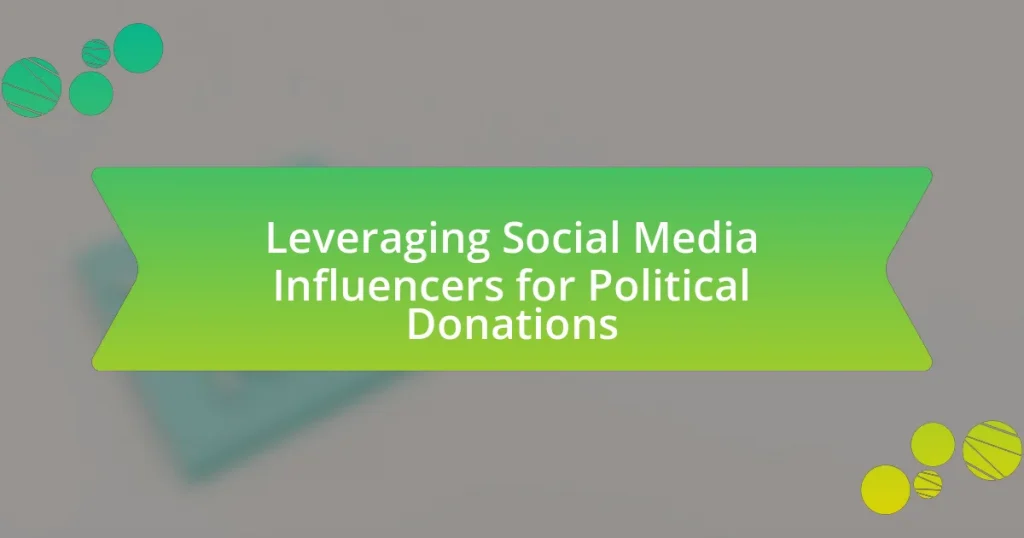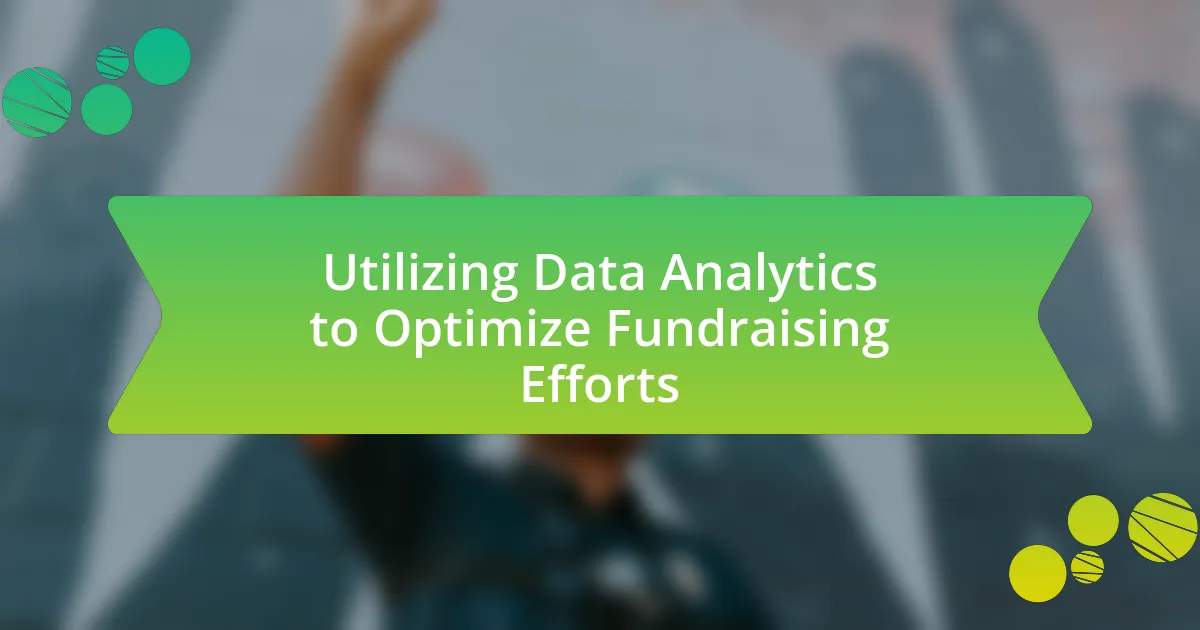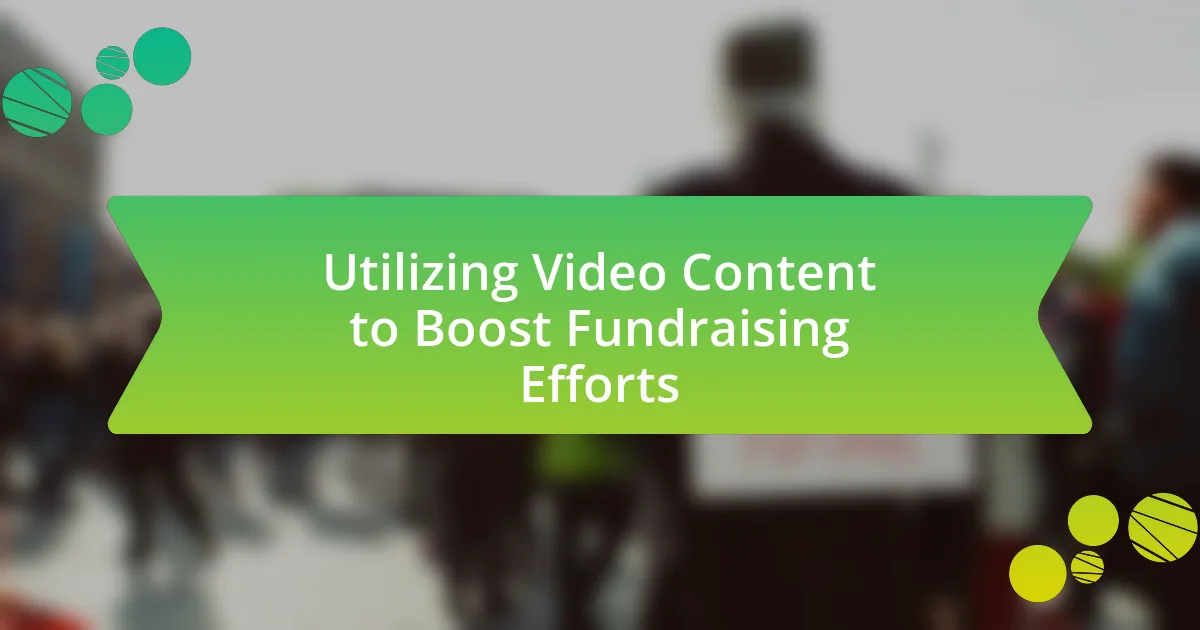Leveraging social media influencers for political donations involves utilizing the credibility and reach of influencers to mobilize financial support for political campaigns. This strategy enhances fundraising efforts by tapping into diverse donor demographics and increasing engagement through personalized content. Influencers significantly impact public opinion on political donations, fostering trust and community among their followers. The article explores the effectiveness of influencer partnerships, strategies for selecting the right influencers, and the challenges and risks associated with these collaborations, ultimately highlighting best practices for successful political fundraising through social media.
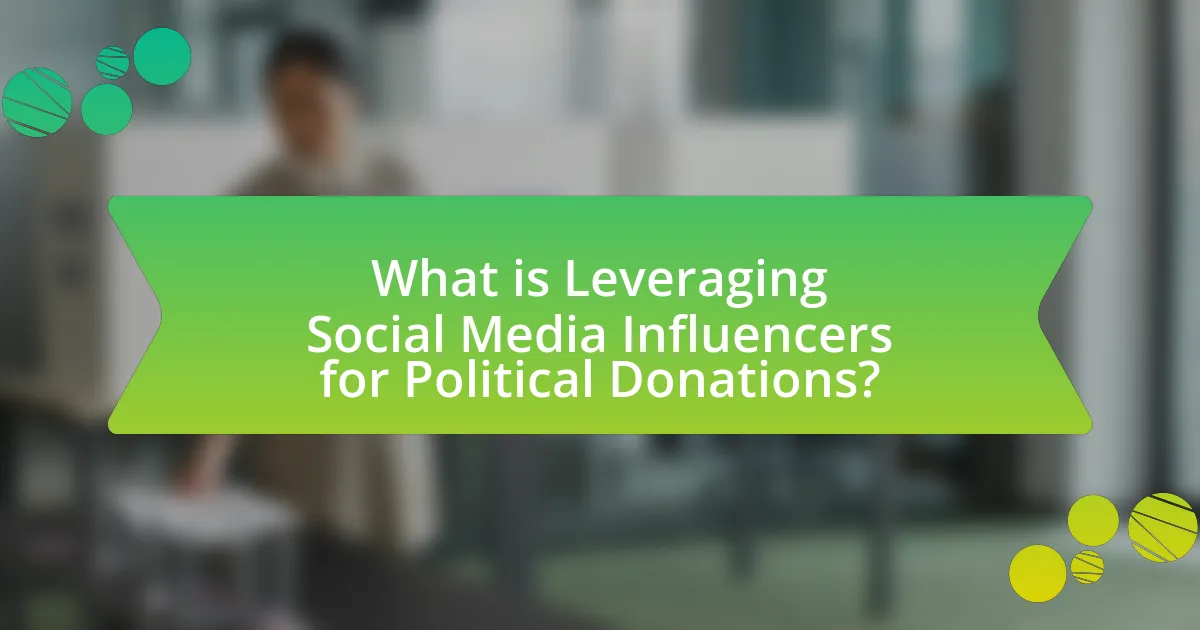
What is Leveraging Social Media Influencers for Political Donations?
Leveraging social media influencers for political donations involves utilizing the reach and credibility of influencers to encourage their followers to contribute financially to political campaigns. This strategy capitalizes on the influencers’ ability to engage large audiences and shape opinions, making them effective advocates for political causes. For instance, a study by the Pew Research Center found that 70% of teens trust influencers more than traditional celebrities, highlighting their potential impact on fundraising efforts. By partnering with influencers, political campaigns can tap into new donor demographics and enhance their fundraising capabilities.
How do social media influencers impact political fundraising?
Social media influencers significantly impact political fundraising by leveraging their large followings to mobilize donations and increase engagement. Influencers can reach diverse audiences quickly, often resulting in increased visibility for political campaigns. For instance, during the 2020 U.S. presidential election, candidates like Joe Biden and Donald Trump utilized influencers to amplify their messages, leading to substantial increases in small-dollar donations. Research from the Pew Research Center indicates that 69% of adults in the U.S. use social media, making it a powerful tool for fundraising efforts. Additionally, influencers often create personalized content that resonates with their followers, fostering a sense of community and encouraging financial support for political causes.
What role do influencers play in shaping public opinion on political donations?
Influencers play a significant role in shaping public opinion on political donations by leveraging their reach and credibility to sway their followers’ perceptions and behaviors. Their endorsements or criticisms of political candidates and their funding sources can significantly impact how the public views the legitimacy and ethics of political donations. For instance, a study by the Pew Research Center found that 70% of social media users have encountered political content, and influencers often act as trusted sources, making their opinions particularly influential. This dynamic can lead to increased scrutiny of political donations and encourage followers to align their financial support with the values and causes promoted by these influencers.
How do influencers engage their audience to encourage donations?
Influencers engage their audience to encourage donations by creating compelling narratives that resonate emotionally with their followers. They often share personal stories or experiences related to the cause, which fosters a sense of connection and urgency. For instance, a study by the University of Southern California found that emotional appeals in social media posts significantly increase engagement and willingness to donate. Additionally, influencers utilize interactive content, such as live streams or Q&A sessions, to directly engage their audience, answer questions, and provide real-time updates on fundraising goals. This approach not only builds trust but also encourages followers to participate actively in the donation process.
Why is leveraging social media influencers important for political campaigns?
Leveraging social media influencers is important for political campaigns because they can significantly amplify a candidate’s message and reach targeted demographics effectively. Influencers possess established trust and credibility with their followers, which can lead to increased engagement and support for political initiatives. For instance, a study by the Pew Research Center found that 72% of teenagers trust influencers more than traditional celebrities, indicating that influencers can sway younger voters who are crucial in elections. Additionally, campaigns that utilize influencers often see higher rates of social media interaction, which can translate into increased donations and volunteer sign-ups, as evidenced by the successful fundraising efforts of various political candidates who have collaborated with influencers during recent election cycles.
What advantages do influencers provide over traditional fundraising methods?
Influencers provide greater reach and engagement compared to traditional fundraising methods. Their established online presence allows them to connect with a diverse audience, often resulting in higher visibility for fundraising campaigns. For instance, a study by the Digital Marketing Institute found that influencer marketing can yield up to 11 times higher return on investment than traditional advertising. Additionally, influencers often foster a sense of community and trust among their followers, which can lead to increased donor loyalty and participation. This trust is crucial, as 70% of consumers are more likely to purchase a product or support a cause recommended by someone they follow online.
How can influencers enhance the reach of political messages?
Influencers can enhance the reach of political messages by leveraging their established audiences and credibility on social media platforms. By sharing political content, influencers can amplify messages to diverse demographics, increasing visibility and engagement. For instance, a study by the Pew Research Center found that 72% of adults use social media, making it a powerful tool for disseminating information. Additionally, influencers often have higher engagement rates than traditional media, which can lead to more meaningful interactions with potential voters. This combination of reach and engagement allows political messages to penetrate deeper into public discourse, ultimately driving awareness and action.
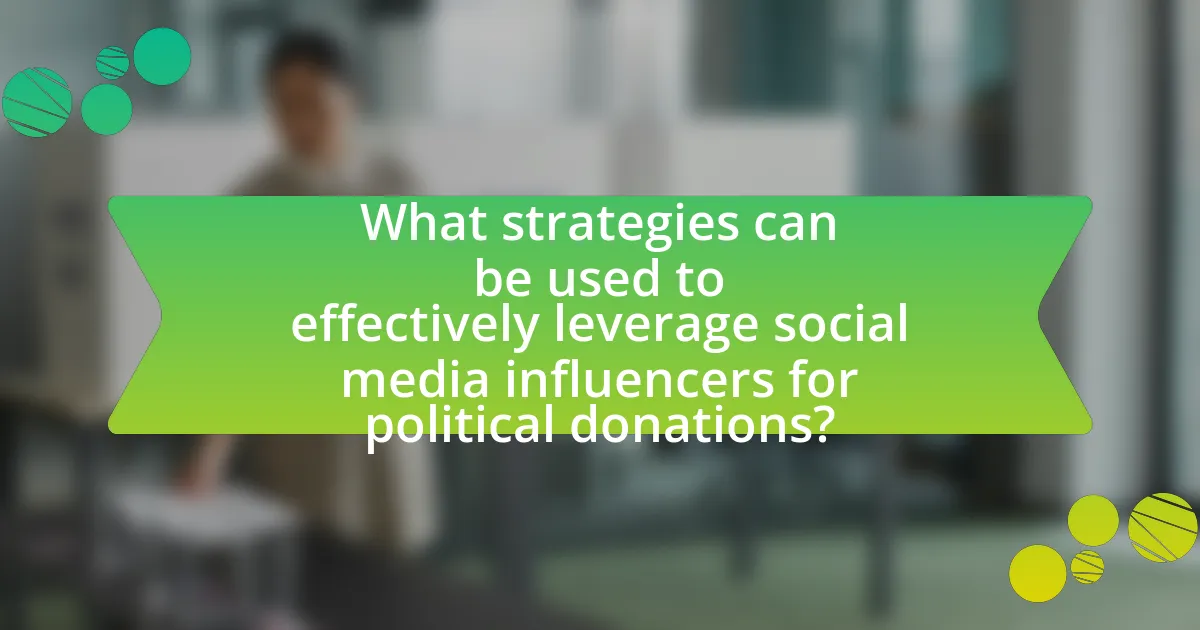
What strategies can be used to effectively leverage social media influencers for political donations?
To effectively leverage social media influencers for political donations, campaigns should focus on strategic partnerships, authentic engagement, and targeted messaging. Strategic partnerships involve selecting influencers whose values align with the campaign’s goals, ensuring that their audience is likely to support the political cause. Authentic engagement is crucial; influencers should share personal stories or experiences related to the campaign, fostering a genuine connection with their followers. Targeted messaging, tailored to the influencer’s audience, can enhance the impact of the call to action for donations. Research indicates that campaigns utilizing influencer marketing can see a return on investment of up to 11 times, highlighting the effectiveness of this approach in driving donations.
How can political campaigns identify the right influencers to partner with?
Political campaigns can identify the right influencers to partner with by analyzing their audience demographics, engagement rates, and alignment with campaign values. Campaigns should utilize social media analytics tools to assess influencers’ follower profiles, ensuring they reach target voter segments. Additionally, examining past collaborations and the influencers’ content relevance can provide insights into their effectiveness in promoting political messages. Research indicates that campaigns that select influencers with a strong connection to their audience and shared values experience higher engagement and conversion rates, making the partnership more impactful.
What criteria should be considered when selecting influencers?
When selecting influencers for political donations, key criteria include audience alignment, engagement rates, authenticity, and reach. Audience alignment ensures that the influencer’s followers match the target demographic of the political campaign, which is crucial for effective messaging. Engagement rates indicate how actively the influencer’s audience interacts with their content, reflecting the potential impact of their endorsements. Authenticity is vital, as influencers who genuinely support the cause are more likely to resonate with their audience, leading to increased trust and action. Lastly, reach measures the size of the influencer’s audience, which can amplify the campaign’s visibility. These criteria collectively enhance the effectiveness of leveraging influencers in political fundraising efforts.
How can campaigns assess an influencer’s audience engagement?
Campaigns can assess an influencer’s audience engagement by analyzing metrics such as likes, comments, shares, and overall interaction rates on their posts. These metrics provide quantitative data that reflects how actively the audience engages with the influencer’s content. For instance, a study by Influencer Marketing Hub indicates that engagement rates typically range from 1% to 3% for most influencers, with higher rates suggesting a more engaged audience. Additionally, tools like social media analytics platforms can track these metrics over time, allowing campaigns to evaluate trends in audience interaction and the effectiveness of influencer partnerships in driving political donations.
What types of content can influencers create to promote political donations?
Influencers can create various types of content to promote political donations, including informative videos, live streams, social media posts, and blog articles. Informative videos can explain the importance of specific political causes and encourage viewers to donate. Live streams allow influencers to engage directly with their audience, fostering a sense of community and urgency around fundraising efforts. Social media posts can share personal stories or testimonials related to the political cause, making the appeal more relatable. Blog articles can provide in-depth analysis of political issues and outline how donations can make a difference. These content types leverage the influencers’ reach and credibility to effectively mobilize their audience for political contributions.
How can storytelling be used to connect with potential donors?
Storytelling can be used to connect with potential donors by creating emotional engagement and illustrating the impact of their contributions. Effective narratives highlight personal experiences or community challenges, making the cause relatable and urgent. For instance, a study by the Stanford Graduate School of Business found that stories can increase donations by up to 30% compared to statistics alone, as they evoke empathy and a sense of connection. By sharing compelling stories through social media platforms, organizations can leverage influencers to amplify their message, reaching a broader audience and fostering a deeper connection with potential donors.
What formats (videos, posts, live streams) are most effective for fundraising?
Videos are the most effective format for fundraising, as they engage viewers emotionally and convey messages more powerfully than static posts. Research indicates that video content can increase donations by up to 150% compared to text-based posts. Live streams also prove effective, as they create real-time interaction and urgency, often leading to higher engagement and immediate contributions. Posts, while useful for sharing information, generally yield lower engagement rates and donations than videos and live streams.
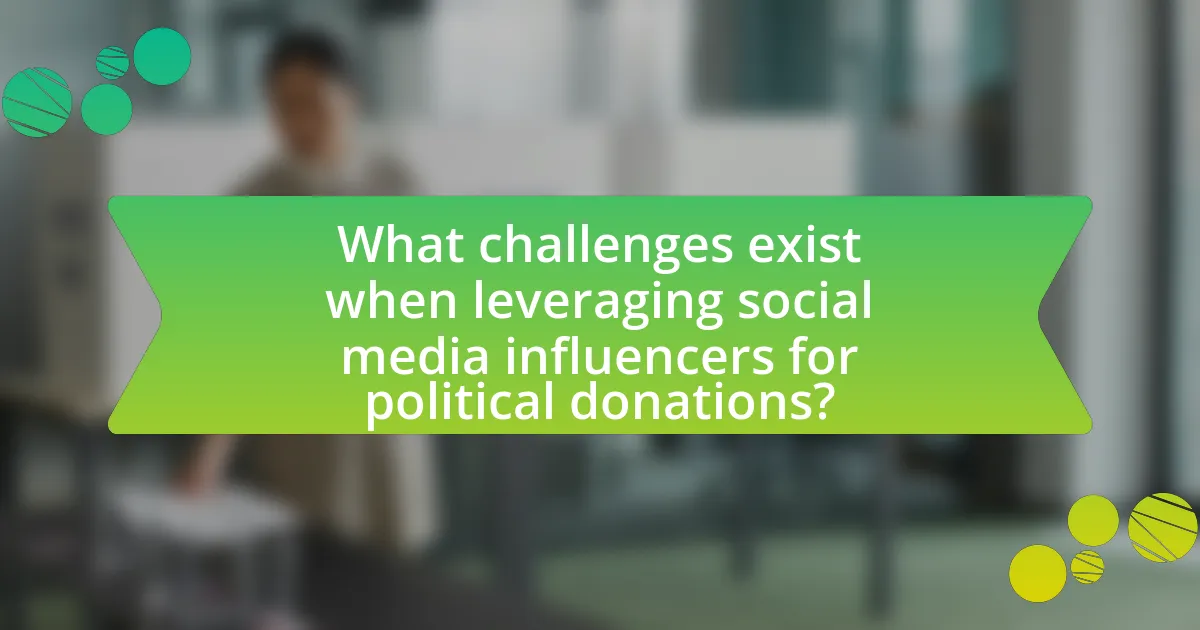
What challenges exist when leveraging social media influencers for political donations?
Leveraging social media influencers for political donations presents several challenges, including authenticity concerns, regulatory compliance, and audience alignment. Authenticity issues arise when influencers may not genuinely support the political cause, leading to skepticism among their followers. Regulatory compliance is critical, as political donations are subject to strict laws, and influencers must disclose partnerships, which can complicate messaging. Additionally, aligning the influencer’s audience with the political campaign’s target demographic is essential; mismatched audiences can result in ineffective outreach and wasted resources. These challenges necessitate careful strategy and execution to ensure successful influencer partnerships in political fundraising.
What potential risks should campaigns be aware of when working with influencers?
Campaigns should be aware of several potential risks when working with influencers, including reputational damage, lack of authenticity, and regulatory compliance issues. Reputational damage can occur if an influencer engages in controversial behavior or makes statements that conflict with the campaign’s values, leading to negative public perception. Lack of authenticity may arise if the influencer’s audience perceives the partnership as inauthentic or purely transactional, which can diminish the effectiveness of the campaign. Regulatory compliance issues are critical, as campaigns must ensure that influencers disclose paid partnerships according to Federal Trade Commission (FTC) guidelines; failure to do so can result in legal repercussions and fines. These risks highlight the importance of thorough vetting and clear communication between campaigns and influencers.
How can negative publicity surrounding an influencer affect a campaign?
Negative publicity surrounding an influencer can significantly undermine a campaign’s effectiveness. When an influencer faces backlash, it can lead to decreased trust and credibility among their followers, which may result in reduced engagement and support for the campaign they are promoting. For instance, a study by the University of Southern California found that negative news about a celebrity can lead to a 20% drop in consumer trust, directly impacting their endorsement power. Consequently, if an influencer is embroiled in controversy, the campaign may struggle to resonate with the target audience, ultimately affecting fundraising and voter mobilization efforts.
What measures can be taken to mitigate risks associated with influencer partnerships?
To mitigate risks associated with influencer partnerships, organizations should conduct thorough vetting of influencers, establish clear contractual agreements, and monitor influencer activities continuously. Vetting involves assessing the influencer’s audience demographics, engagement rates, and past behavior to ensure alignment with the organization’s values and goals. Clear contractual agreements should outline expectations, deliverables, and compliance with legal regulations, such as disclosure requirements mandated by the Federal Trade Commission. Continuous monitoring allows organizations to quickly address any negative behavior or misalignment that may arise during the partnership, thereby protecting their reputation and ensuring compliance with relevant laws.
How can campaigns measure the effectiveness of influencer-driven fundraising efforts?
Campaigns can measure the effectiveness of influencer-driven fundraising efforts by analyzing key performance indicators (KPIs) such as total funds raised, engagement rates, and conversion rates from influencer promotions. For instance, tracking the amount of donations generated during and after an influencer’s campaign can provide direct insight into financial impact. Additionally, monitoring engagement metrics like likes, shares, and comments on influencer posts can indicate audience interest and reach. Conversion rates, which reflect the percentage of viewers who made a donation after interacting with the influencer’s content, further quantify the campaign’s success. Research shows that campaigns utilizing influencers can see a return on investment (ROI) of up to 11 times for every dollar spent, highlighting the potential effectiveness of these efforts.
What metrics should be tracked to evaluate success?
To evaluate success in leveraging social media influencers for political donations, key metrics include engagement rate, conversion rate, reach, and return on investment (ROI). Engagement rate measures the level of interaction (likes, shares, comments) with influencer content, indicating audience interest and involvement. Conversion rate tracks the percentage of followers who take action, such as donating after exposure to influencer campaigns, reflecting the effectiveness of the messaging. Reach quantifies the total number of unique users who see the content, providing insight into the campaign’s visibility. ROI assesses the financial return relative to the investment made in influencer partnerships, ensuring that the campaign is cost-effective. These metrics collectively provide a comprehensive view of the campaign’s performance and impact on political donations.
How can feedback from donors inform future influencer strategies?
Feedback from donors can significantly inform future influencer strategies by providing insights into donor preferences and engagement levels. Analyzing donor feedback allows organizations to identify which influencers resonate most with their audience, enabling targeted collaborations that enhance campaign effectiveness. For instance, a study by the Pew Research Center indicates that 70% of social media users are influenced by recommendations from individuals they follow, highlighting the importance of aligning influencer partnerships with donor interests. This alignment can lead to increased donor retention and higher contribution levels, as tailored influencer strategies foster a sense of community and trust among supporters.
What best practices should be followed when leveraging social media influencers for political donations?
To effectively leverage social media influencers for political donations, campaigns should prioritize authenticity, transparency, and targeted engagement. Authenticity ensures that influencers genuinely support the campaign, which resonates with their audience; for instance, a study by the Digital Marketing Institute found that 61% of consumers trust influencers who are perceived as authentic. Transparency about the nature of the partnership and the intended use of donations builds trust with potential donors, as evidenced by the Federal Election Commission guidelines that require disclosure of paid endorsements. Targeted engagement involves selecting influencers whose audience demographics align with the campaign’s target voter base, maximizing the impact of outreach efforts. By adhering to these best practices, political campaigns can enhance their fundraising effectiveness through social media influencers.
